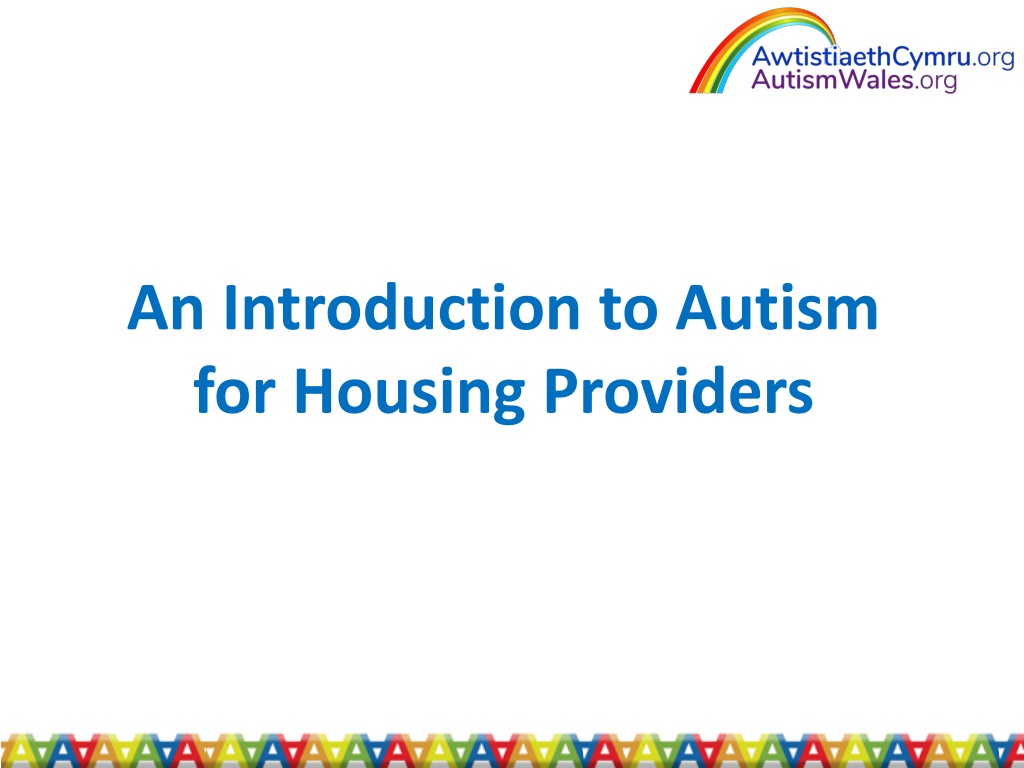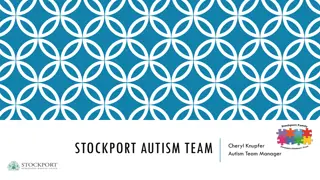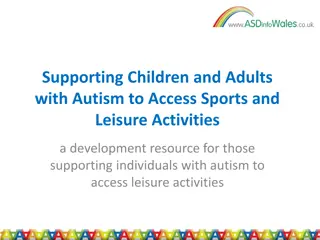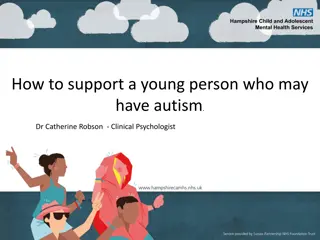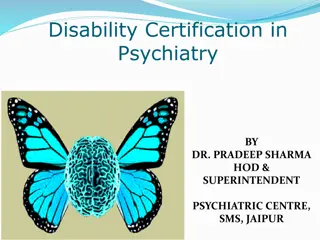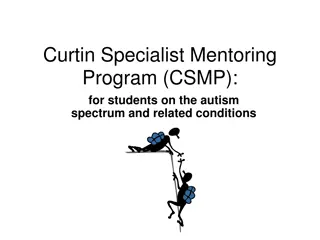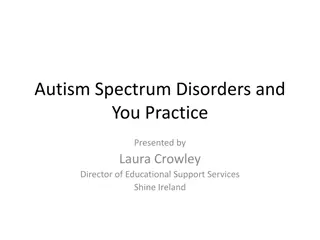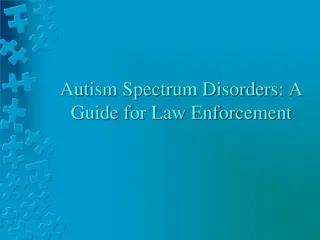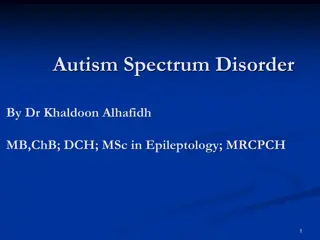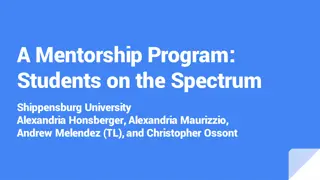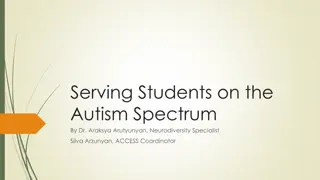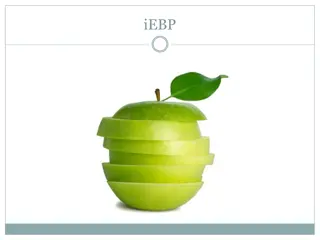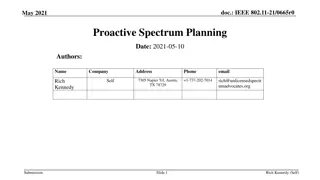Understanding Autism Spectrum Disorders for Housing Providers
Autism is a lifelong condition that affects individuals in various ways, encompassing disorders like Autism Spectrum Disorder (ASD) and Asperger's Syndrome. People with autism may experience challenges in social interaction, communication, and sensory responses, leading to unique perspectives and behaviors. Recognizing the signs of autism, such as impaired social interaction and verbal communication, is crucial for providing appropriate support and accommodations to individuals with autism.
Download Presentation

Please find below an Image/Link to download the presentation.
The content on the website is provided AS IS for your information and personal use only. It may not be sold, licensed, or shared on other websites without obtaining consent from the author. Download presentation by click this link. If you encounter any issues during the download, it is possible that the publisher has removed the file from their server.
E N D
Presentation Transcript
An Introduction to Autism for Housing Providers
Autism It is estimated that 1 in every 100 people in the UK have Autism Autism is a lifelong condition and affects people from all backgrounds Autism affects more males than females Many people with autism have not been diagnosed, and therefore may not realise they have the condition
In this e-learning resource we use the word autism to encompass the spectrum of disorders including: Autism Spectrum Disorder (ASD) Asperger s Syndrome Autistic Spectrum Condition (ASC) Childhood Autism Pervasive Developmental Disorder
We refer to an Autism Spectrum because of the way in which the condition affects individuals can vary On one end of the spectrum people with autism may have an additional learning disability and be more severely impaired On the other end individuals may have an average or above average intellect and may function at a higher level
SIGNS of Autism Social Interaction and Verbal Communication are Impaired Imagination, ideas and creativity are reduced Gestures and non verbal communication are limited Narrow range of interests, routines and repetitive behaviours Sensory responses are unusual
Social Interaction and Verbal Communication are Impaired Autistic people have impairments in social interaction and verbal communication. The way in which the person is affected varies. These impairments can include difficulties in : sharing understanding social niceties taking turns enjoying conversation using and understanding language showing concern for others
Social Interaction and Verbal Communication are Impaired Talking on the phone may be difficult Letters that are unclear or unstructured maybe missed or misunderstood Social rules may not be understood and additional support or advice may be needed with queuing, turn taking and team activities. Making and maintaining friendships may be difficult, leading to social isolation Autistic people may not enjoy conversation in the same way, and therefore prefer to discuss factual issues rather than enjoying the interaction with another. Autistic people may interpret language literally and so may misunderstand idioms ( pull your socks up ) and metaphors ( my head was spinning ).
Social Interaction and Verbal Communication are Impaired Here are some ways that you can adapt your communication to help autistic people : Allow time for the person to process information Speak slowly and clearly Don t use idioms or metaphors Avoid relying on gesture, facial expression or tone of voice Ensure letters are clear, concise and structured Keep instructions short
Social Interaction and Verbal Communication are Impaired Here are some ways that you can adapt your communication to help autistic people: Initiate social interactions, if the person needs help they may not feel confident enough to ask Explain rules rather than assuming they are understood Stick to facts and keep social chit chat to a minimum Provide additional instruction or clear plans to help with paying bills or contacting others Provide additional structure within activities involving turn taking or team activities
Social Interaction and Verbal Communication are Impaired Practice example 1 John, an autistic adult, needs to report a problem to his housing provider. He calls the number provided to him and hears a recorded menu. John panics and hangs up and is now worried how to let them know about his problem. What could be the problem? How could you help John?
Social Interaction and Verbal Communication are Impaired John always finds talking on the phone anxiety provoking, he worries he doesn t know who he is talking to and is unsure how to work out when it is his turn to speak when he can t. An additional barrier is now the recorded menu, he doesn t understand the options and is worried he ll choose the wrong one. The housing provider could have provided him with an email address instead, or a number to contact via text. They could also have given him a written list of the phone menu options so he was able to choose the correct option.
Imagination, ideas and creativity are reduced Autistic people experience reduced imagination, ideas and creativity. Again, the extent varies from one person to another. The impact of this can be affect many areas of daily life and may include difficulties in: predicting reactions and events problem solving relating to others creative activities planning coping with changes
Imagination, ideas and creativity are reduced How this impacts on day to day life: Often making free choices or generating creative ideas is difficult. When problem solving, we rely on our social imagination to predict possible outcomes. This is difficult for autistic people . Planning can be difficult. Autistic people often rely on calendars or planners to help them with this. Some autistic people have difficulties with creative imagination. Others have good creative imagination, and only the social imagination is affected. Coping with changes can be difficult. Autistic people usually prefer routines to unpredictability.
Imagination, ideas and creativity are reduced Here are some ways that you help autistic people with difficulties in social imagination: Use specific questions and limit using open questions Give a limited number of choices when giving options Break down instructions into smaller steps Ensure correspondence outlines tasks to be completed don t assume the person knows Provide options rather than relying on the person to create an idea Support with problem solving
Imagination, ideas and creativity are reduced Practice example 2 Sam, an autistic adult, is having problems with neighbours and has requested a move. A member of staff meets with Sam to understand what the issues are and whether he should be relocated. This involves asking lots of open questions such as Why do you think your neighbour is annoyed with you and gives Sam lots of options and opinions about moving. Sam becomes anxious when he is unable to answer and asks the member of staff to leave his home What could be the problem? How could you help Sam?
Imagination, ideas and creativity are reduced Autistic people, like Sam, have reduced imagination, ideas and creativity, this means they find problem solving difficult as we rely on our social imagination to predict possible outcomes. Planning or thinking ahead can also be difficult without a good social imagination which explains why Sam was unable to say what sort of place he wanted to move to. Sam has difficulties in generating creative ideas or making free choices, to help autistic people you should give a limited number of choices and provide options rather than making the person develop their own ideas. Instead of asking open questions you should instead be specific with what you are asking them, and don t expect them to imagine what other people are thinking or feeling. For example, instead of Why do you think your neighbour is annoyed with you you could ask What did your neighbour say when he shouted at you?
Gestures and non verbal communication are limited This can include difficulties in using and understanding: facial expression body language tone of voice eye contact gestures
Gestures and non verbal communication are limited In order to understand when someone is being sarcastic, we analyse many non verbal cues. This means that autistic people may struggle to recognise and appreciate sarcasm. Avoiding eye contact maybe interpreted as the person being rude, it is not. We often rely on tone of voice, as well as words to convey a point. Autistic people may not be able to use or understand the meaning of this easily. Autistic people may find it difficult to interpret the meaning of your gestures for example pointing to indicate an object or direction. Autistic people may not be able to use or may have limited use of gesture. Many autistic people find it difficult to concentrate on giving eye contact and listen at the same time.
Gestures and non verbal communication are limited Here are some ways that you help autistic people with difficulties with gestures and non verbal communication: Do not rely on gesture or body language to communicate or emphasise a point Understand many autistic people do not like eye contact, they are not being rude Do not use gestures such as pointing in order to direct someone Try to keep an even tone of voice
Gestures and non verbal communication are limited Practice example 3 Rachel, an autistic adult, has had a new door lock fitted. The fitter explains how she needs to lift the door handle up and turn the key twice to lock and unlock the door using gesture. After he leaves Rachel cannot lock the door. What could be the problem? What could be done differently to support Rachel?
Gestures and non verbal communication are limited Rachel finds it difficult to use and understand the meaning of gestures, you should not rely on gestures to convey a point and instead say exactly what you mean. The fitter could have demonstrated the process rather than using gesture to explain it.
Narrow range of interests, routines and repetitive behaviours Autistic people frequently have narrow range of interests, routines and repetitive behaviours. The way in which the person is affected varies. This can include: Repetitive movements such as hand flapping, spinning or finger flicking Insistence on repetitive behaviours or rituals Over focussed unusual or highly specific interests and hobbies Dislike of change, new people or activities
Narrow range of interests, routines and repetitive behaviours Here are some ways that you help autistic people: Use planners and timetables to prepare for ad hoc events Explain changes in advance Engage in special interests Stick to agreed times, and if running late let the person know ASAP Understand that changes made to the home can be distressing Try and ensure all contact is with a familiar person
Narrow range of interests, routines and repetitive behaviours Practice example 4 Martin, an autistic adult, has a broken tap. A new repair man has just started work, and arrives at Martin s house. Martin sees him through the window and becomes anxious. He retreats to his bedroom and doesn t answer the door. What could be the problem? What could be done to help Martin if this was to happen again?
Narrow range of interests, routines and repetitive behaviours Autistic people may dislike change, new people or activities. Martin was not expecting a different repair man and became anxious when someone unfamiliar approached the house. In order to reduce Martin s anxiety in the future you could prepare Martin by warning him of the change in advance. Sending a familiar person along with the repair man would also help.
Sensory responses are unusual Many autistic people can have sensory issues. The autistic person s perception of the senses can be heightened or decreased. All the senses can be affected. tactile (touch) (movement) vestibular proprioceptive (body position) visual (looking) auditory (hearing) (smell) olfactory gustatory (taste)
Sensory responses are unusual Sensory responses are unusual Here are some ways that you help people with unusual sensory responses: Be aware background noise can impact on their ability to focus on what you are saying Dim bright lights in offices Find a quiet place for meetings Understand that sensory perceptions are different to yours Ask about sensory issues, and take notice when informed of them
Sensory responses are unusual Practice example 5 Mary has made a complaint about her neighbours to the housing association. An elderly couple live in the flat above Mary and she says that the noise they are making in the day is disturbing her to the level that she is not able to concentrate on reading, sewing or watching TV. A member of staff visits Mary and cant hear anything significant, she feeds back to her manager that Mary must be making up the issue with noise as he wants to move from a flat to a house. What could be the problem?
Sensory responses are unusual Autistic people can have a heightened or decreased perception of the sensory information. Mary can indeed hear noises coming from upstairs that are disturbing her. The elderly gentleman upstairs has a lung condition and uses a nebuliser on occasion throughout the day. It is the noise and vibration of this that is disturbing Mary. If the member of staff had listened to Mary rather than assuming Mary heard the same thing as her, she could have explored what the issue was. She could have spoken to the couple and found out what the noise was and explained to Mary. A negotiation may have helped, a knock on the floor to tell Mary they were switching the nebuliser on would enable Mary to put her ear defenders on for that short period. Sensory issues should have been explored before allocating a flat, because noises from upstairs or downstairs can be annoying / distressing when perceived through heightened senses.
How you can help: If struggling ask ask the person, carers or seek advice from others Be understanding, autistic people can live fulfilling lives if given the opportunity to Consider how sensory issues may be impacting the individual Adapt your communication style Being aware of the difficulties experienced by autistic people is key
There are numerous resources to help support autistic people on our website. www.AutismWales.org AutsimWales@WLGA.gov.uk @AutismWales AutismWales
